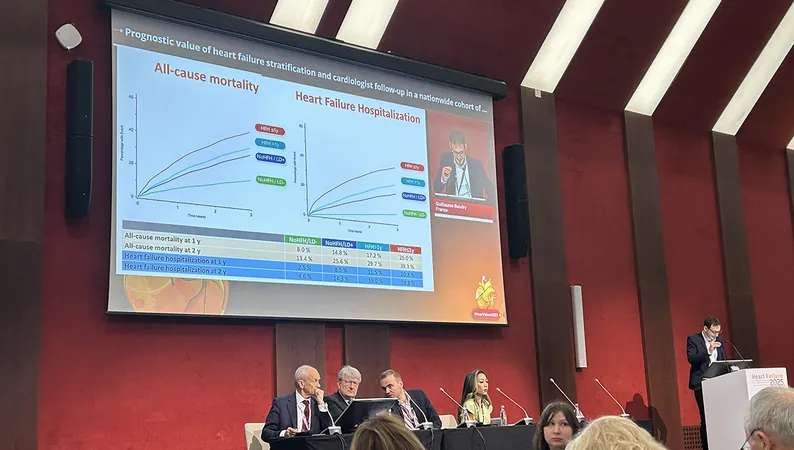
Unlocking Better Heart Health: Why Cardiology Consults Are a Game Changer for Heart Failure Patients
2025-05-19
Author: Li
New Study Reveals Cardiology Consults Save Lives
BELGRADE, Serbia—A groundbreaking study has unveiled a straightforward method for evaluating heart failure (HF) patients based on hospitalization history and loop diuretic usage. This approach not only predicts health outcomes but also highlights patients who could significantly benefit from increased cardiologist visits.
The research, presented at the European Society of Cardiology’s Heart Failure 2025 congress by Dr. Guillaume Baudry from the University of Lorraine, reveals a staggering statistic: nearly one-third of heart failure patients never consult a cardiologist. This oversight places them at a dramatically higher risk of mortality within a year compared to those who receive even minimal specialist care.
High-Risk Patients Need More Attention
Patients with a history of HF hospitalizations within the last five years showed the greatest potential for improvement through cardiology consultations. Dr. Baudry emphasized that this risk assessment technique is versatile and can be implemented globally, proving beneficial even in areas lacking advanced diagnostic tools.
With heart failure rates soaring worldwide, the shortage of cardiologists underscores the urgency for efficient patient follow-up. "It's a pressing public health issue in affluent nations," said Dr. Baudry.
Innovative Solutions for Managing Heart Failure
Dr. Piotr Ponikowski from Wroclaw Medical University echoed the necessity for effective resource management in heart failure care. He pointed out that while tailoring cardiology visits to the severity of heart failure is valuable, there’s a growing need for innovative patient management strategies. Recent studies, including one that utilizes artificial intelligence for electrocardiogram analysis, show promise in addressing this rising global health concern.
Inside the French-DataHF Study
Dubbed the French-DataHF study, researchers investigated whether straightforward criteria could effectively categorize heart failure severity. They analyzed health insurance data from over 655,000 patients born out of necessity to find effective management solutions.
Patients were categorized into four risk groups based on their hospitalization records and diuretic use, ranging from the lowest risk, with no recent hospitalizations or diuretic use, to high-risk individuals who had been hospitalized within the past year.
Dramatic Differences in Outcomes
The study revealed stark contrasts in mortality rates: just 8% of patients in the lowest-risk category died within a year compared to a staggering 25% in the highest risk group. More notably, the likelihood of dying significantly increased for those in medium to high-risk categories—by over 230% in the highest risk group.
Surprisingly, many patients, regardless of risk status, had no cardiology consultations. However, those who did visit a cardiologist showed markedly lower mortality rates, with the most visits correlating with the least risk.
A Call to Action
The findings suggest that by targeting the right patients for cardiology consultations, healthcare systems could potentially save over 70,000 lives annually. While the study has limitations, including the observational nature and potential confounding factors, the consensus among experts remains clear: ongoing cardiology support is vital for enhanced outcomes.
In a striking commentary, Dr. Lars Lund of Karolinska University Hospital cautioned against the trend of shifting heart failure patients away from specialists and back into the primary care realm, which is often ill-equipped to handle the complexities of heart failure management.



 Brasil (PT)
Brasil (PT)
 Canada (EN)
Canada (EN)
 Chile (ES)
Chile (ES)
 Česko (CS)
Česko (CS)
 대한민국 (KO)
대한민국 (KO)
 España (ES)
España (ES)
 France (FR)
France (FR)
 Hong Kong (EN)
Hong Kong (EN)
 Italia (IT)
Italia (IT)
 日本 (JA)
日本 (JA)
 Magyarország (HU)
Magyarország (HU)
 Norge (NO)
Norge (NO)
 Polska (PL)
Polska (PL)
 Schweiz (DE)
Schweiz (DE)
 Singapore (EN)
Singapore (EN)
 Sverige (SV)
Sverige (SV)
 Suomi (FI)
Suomi (FI)
 Türkiye (TR)
Türkiye (TR)
 الإمارات العربية المتحدة (AR)
الإمارات العربية المتحدة (AR)